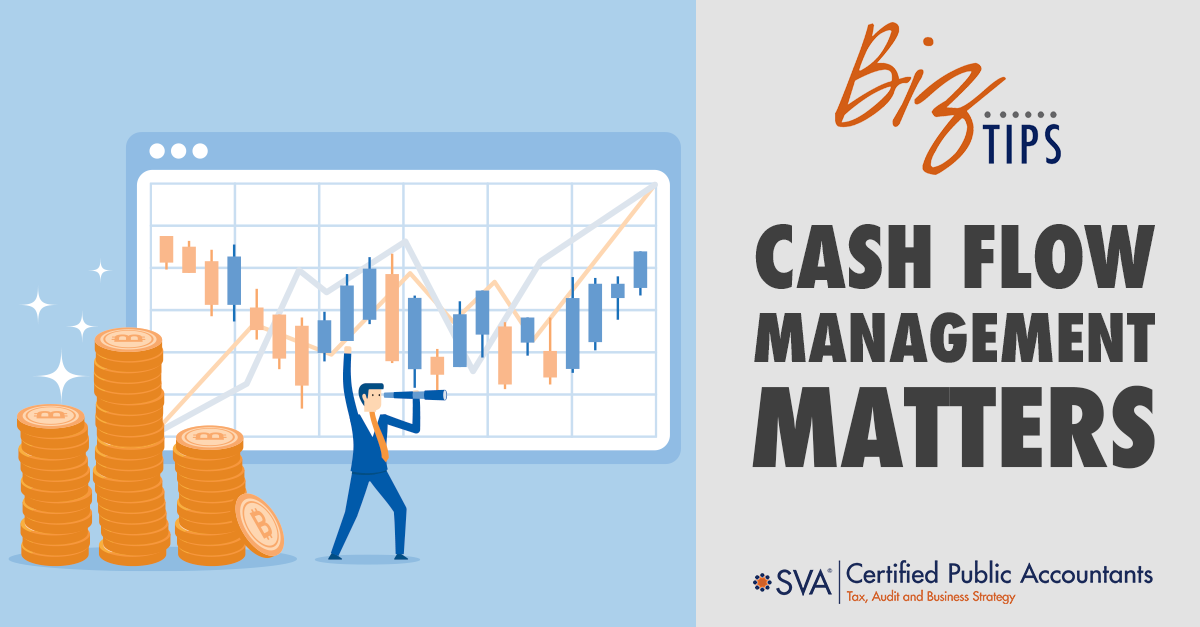| Highlights: |
- Explains the fundamentals of cash flow management, differentiating between cash accounting and accrual accounting and why timing matters for business liquidity.
- Offers practical tips to manage cash flow, including creating cash-flow statements, reviewing receivables, controlling spending, and regularly updating projections.
- Breaks down cash flow types (operations, financing, investments) and provides strategies to improve cash position through revenue growth, expense reduction, and better financial practices.
|
Cash flow management is one of the foundational elements of your business's financial picture. It involves knowing when your cash is coming in and managing your spending to your available cash. Revenue is the money that comes into your business, while cash flow management measures how much is coming in and going out.
(Download Video Transcript)
Are You Using Cash Accounting or Accrual Accounting?
With the cash accounting method, your books will align with the amount of cash you have readily available. However, your cash flow management is even more critical if you use the accrual accounting method.
With the accrual accounting method, revenue is entered into your books when an invoice is generated, but the cash is not available until the customer pays the invoice. It is essential to understand which method you use and how it impacts your cash flow management.
Wondering How to Manage Your Cash Flow?
Here are five tips:
- Generate cash flow statements and projections to analyze how money moves through your business.
- Review your accounts receivable to determine if you can speed up payments or deposits.
- Stay current on your bookkeeping to ensure your financial transactions are up to date.
- Overspending can cause issues, so consider what you are purchasing and if it is a strategic purchase or if it can wait.
- Review your cash flow projections often. The more you analyze how cash flows in and out of your business, the better you understand when you need to make adjustments.
(Download Video Transcript)
What Do I Need to Know About Cash Flow Statements?
There are three areas of cash flow coming into your business:
- Cash from Operations
- Cash from Financing
- Cash from Investments
Operational cash is just what it sounds like – the cash generated from business revenue, sales of inventory, assets, etc. Cash from financing is what you receive from lenders for short-term and long-term financing. Cash from investments reflects the gains and losses of your investments, including buying or selling equipment.
When analyzing your cash flow, you should delve into positive and negative cash flow scenarios:
Positive Cash Flow
This is an indicator of your company's health and sustainability in growing its operations. Too much cash may mean you aren't investing enough back into the business. You may want to use excess cash to pay down debt, purchase equipment, or acquire another company.
Negative Cash Flow
This isn't always a bad indicator. If your business is spending cash to invest in property and equipment to help grow the business, negative cash flow can be a good thing. However, if you consistently have negative cash flow, you will need to make modifications to ensure you have enough cash to timely pay bills.
Generating cash flow statements and projections can be done with your accounting software. Talk with your accountant and, if needed, look for a new accounting system that will give you the timely reports you need to make informed decisions.
How Do I Improve Cash Flow?
Increase Revenue
When exploring ways to increase revenue, ask yourself and your management team these four questions:
- How could we generate more customers?
- Is there an opportunity to increase the average sales per customer?
- Should we increase prices on some of our products/services?
- What incentives could we put in place so customers buy more often?
Generate a list of ideas and start implementing a few at a time. Monitor what works and adjust your strategy as you move through the year.
Reduce Overhead
If you spend less on operations, you will have more cash left at the end of the month. Look at your vendors to see if you are getting the best pricing. Could you buy more at one time to get better prices? Are your processes efficient or are there ways to streamline to reduce costs?
Manage Inventory
Inventory management will ensure you have enough inventory to fill orders, but not so much that you have cash tied up for long periods. If you have excess inventory, consider a sale to free up cash. This is an area you should be continually reviewing with a particular focus on the seasonality of your products.
Match Receivables to Payables
Aligning your accounts receivable to accounts payable will help you alleviate cash crunches at the end of the month. If your customers typically pay at the end of the month, ask your bank to align your loan payments at the end of the month, versus mid-month. Incentivize customers to pay on time by charging a small interest fee if invoices are paid late.
(Download Video Transcript)
Speed Up Invoicing
Give customers 30 days to pay, instead of 60, to bring cash in faster. Offering credit card payments may help customers pay earlier. Give a percentage off if the invoices are paid in 10 days or less.
Pay Debts Faster or Refinance Debt
Pay off debts earlier when you have excess cash. Aligning extra payments during the times you have a higher sales volume will mean you have less to pay when cash flow may be lighter. Make sure you work with your financial institution on the best options so you don't incur penalties for prepayments.
Review your loan contracts and obligations with your accountant and financial institution to determine if better financing is available. Perhaps changing the terms of a loan or combining several loans will give you a better interest rate or a faster paydown of the principal.
Sell Assets
As a last resort in a cash crunch, you may need to sell assets. Keep a list of assets no longer used, or those that you could liquidate if the need arises.
Get an Outside Opinion
Cash flow is just one element of building a company that is prepared for the future. Work with an accountant who understands your industry to review your financial picture fully.
Take an in-depth look at your financials and benefit from the expertise of an experienced advisor. You will be glad you did.
© 2022 SVA Certified Public Accountants

